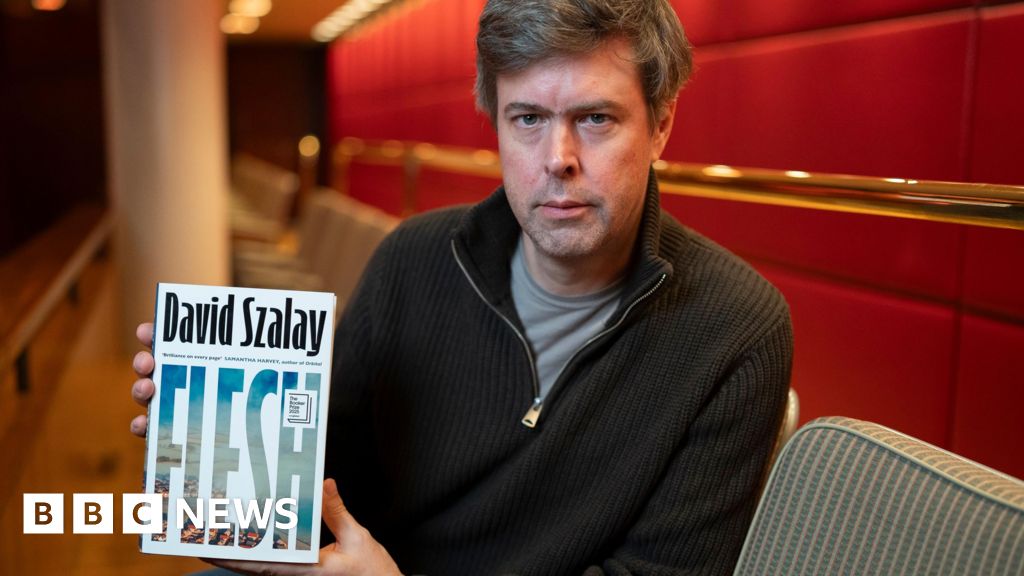Booker Prize won by 'extraordinary' Flesh by David Szalay

```html David Szalay's 'Flesh' Wins Booker Prize, Lauded as 'Extraordinary'
British-Hungarian author David Szalay has been awarded the prestigious Booker Prize for his novel, 'Flesh'. The judging panel, chaired by author Roddy Doyle, hailed the book as "extraordinary" and "a very special book," citing its singularity and compelling narrative.
'Flesh' delves into the life of Istvan, an emotionally detached man navigating various stages of his existence, from a Hungarian housing estate to the opulent world of London's elite. The novel explores themes of class, power, intimacy, migration, and masculinity through a minimalist and evocative style.
Judges Praise Szalay's Unique Writing Style
Roddy Doyle emphasized the novel's distinctiveness, stating, "What we particularly liked about Flesh was its singularity. It's just not like any other book. It's a dark book, but we all found it a joy to read." The judges also lauded Szalay's spare writing and effective use of white space, noting how much is revealed without being overtly stated. Doyle found the dialogue "superb - and the absence of it was superb."
Gaby Wood, chief executive of the Booker Prize Foundation, echoed this sentiment, stating the judges found the novel "spare, disciplined, urgent, honest and heartbreaking." She added, "With Flesh, they all agreed, David Szalay breaks new ground."
Szalay 'Dazed' by Win, Celebrated by Celebrities
Speaking to the BBC, Szalay admitted to feeling "a bit dazed" by the win. "I did maybe too thorough a job of convincing myself that I wasn't going to win in order to get through the evening without too much stress, and now I have to catch up a bit in my head," he said. "But it's fantastic, of course."
The novel has garnered attention beyond literary circles, with endorsements from figures like Dua Lipa and Stormzy. Dua Lipa, who featured 'Flesh' in her book club, described it as a "tense and gripping read." Stormzy recorded an extract of the book for a short film presented at the Booker Prize ceremony.
Critical Acclaim for 'Flesh'
Reviewers have consistently praised 'Flesh'. The Guardian called it a "brilliantly spare portrait of a man" and a "thrilling exploration of what it means to be alive." The Sunday Times highlighted Szalay's use of a single character to depict "these three stages of modern man."
Historical Context and Analysis
The Booker Prize, established in 1969, is one of the most prestigious literary awards in the English-speaking world. It recognizes outstanding works of fiction and has played a significant role in shaping contemporary literature. Previous winners include literary giants such as Salman Rushdie, Margaret Atwood, and Hilary Mantel.
Dr. Eleanor Vance, a professor of contemporary literature at the University of Oxford, commented on Szalay's win: "Szalay's victory reflects a broader trend in contemporary fiction towards minimalist narratives that explore complex themes with subtlety and restraint. 'Flesh' is a powerful example of how less can be more, and its exploration of modern masculinity resonates deeply in our current cultural landscape."
She further elaborated, "The Booker Prize often rewards novels that push boundaries, and Szalay's work certainly does that. While previous winners have tackled grand historical narratives or sweeping social issues, 'Flesh' focuses on the interior life of a single character, offering a nuanced and intimate portrayal of the human condition."
Szalay's Second Nomination and the Shortlist
'Flesh' is Szalay's sixth novel. He was previously nominated for the Booker Prize in 2016 for 'All That Man Is', another exploration of modern masculinity. He receives £50,000 for winning this year's prize.
The other shortlisted novels were:
Susan Choi - Flashlight Kiran Desai - The Loneliness of Sonia and Sunny Katie Kitamura - Audition Ben Markovits - The Rest of Our Lives Andrew Miller - The Land in Winter
The Booker Prize continues to be a vital platform for celebrating literary excellence and promoting thought-provoking fiction on a global scale. Szalay's win further solidifies his position as a significant voice in contemporary literature. ```
Originally sourced from: BBC Entertainment
